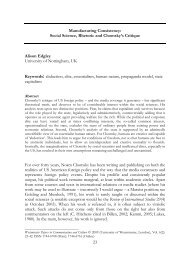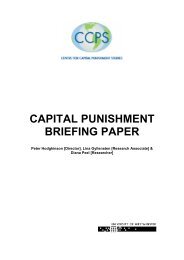Letter to Caroline Spelman MP - University of Westminster
Letter to Caroline Spelman MP - University of Westminster
Letter to Caroline Spelman MP - University of Westminster
Create successful ePaper yourself
Turn your PDF publications into a flip-book with our unique Google optimized e-Paper software.
Department <strong>of</strong> Applied Social Sciences<br />
Ladbroke House<br />
62/66 Highbury Grove<br />
London<br />
N5 2AD<br />
<strong>Caroline</strong> <strong>Spelman</strong> <strong>MP</strong><br />
Shadow Secretary <strong>of</strong> State for Communities and Local Government<br />
House <strong>of</strong> Commons<br />
London SW1 1AA<br />
19th Oc<strong>to</strong>ber 2009<br />
Dear Ms <strong>Spelman</strong>,<br />
Conservative Party Policy on Regional Planning<br />
I am writing <strong>to</strong> you in response <strong>to</strong> your recent policy paper, Control Shift and your<br />
subsequent letter on the Abolition <strong>of</strong> Regional Planning. I convene the ‘Highbury<br />
Group’ a working group <strong>of</strong> experts from public, private and independent sec<strong>to</strong>rs on<br />
housing and the credit crunch. The group includes a number <strong>of</strong> individuals who have<br />
extensive experience from the last housing crash and earlier <strong>of</strong> maintaining housing<br />
output in a challenging economic climate.<br />
Our main aim is <strong>to</strong> suggest appropriate interventions <strong>to</strong> ensure the continuation <strong>of</strong> the<br />
development <strong>of</strong> housing and we have drafted papers on appropriate interventions,<br />
which have been discussed with the Homes and Communities Agency. Myself and<br />
other members <strong>of</strong> the group had a useful meeting with Tim Collins, adviser <strong>to</strong> Grant<br />
Shapps <strong>MP</strong>, in July.<br />
The last meeting <strong>of</strong> the group asked me <strong>to</strong> write <strong>to</strong> you <strong>to</strong> express our concerns on<br />
your proposals <strong>to</strong> abolish the current system <strong>of</strong> regional planning.<br />
We welcome the proposals in your policy document ‘Control Shift’ <strong>to</strong> provide new<br />
financial incentives <strong>to</strong> local authorities, which enable housing development. However<br />
we consider that these should be seen as supplementing the current system <strong>of</strong> regional<br />
planning rather than substituting for it.<br />
The group considers that the current three tier structure <strong>of</strong> national, regional, and local<br />
planning, if operated as intended, is an effective way <strong>of</strong> ensuring that new housing is<br />
distributed appropriately in terms <strong>of</strong> meeting both current and projected housing<br />
demand and needs and in accordance with the policy objectives <strong>of</strong> delivering
sustainable communities – sustainable in terms <strong>of</strong> economic, social and transport<br />
infrastructure as well as environmentally sustainable. The group considers that the<br />
current three tier structure <strong>of</strong> national, regional, and local planning, if operated as<br />
intended, is as an effective way <strong>of</strong> ensuring that new housing is distributed<br />
appropriately in terms <strong>of</strong> meeting both current and projected housing demand and<br />
needs and in accordance with the policy objectives <strong>of</strong> delivering sustainable<br />
communities – sustainable in terms <strong>of</strong> economic, social and transport infrastructure as<br />
well as environmentally sustainable. It can do so in a way that does not ride roughshod<br />
over local aspirations, but recognises that there will be occasions when local<br />
preferences will have <strong>to</strong> take second place <strong>to</strong> the wider needs <strong>of</strong> society.<br />
A Regional Plan is however necessary <strong>to</strong> provide confidence <strong>to</strong> inves<strong>to</strong>rs and planning<br />
authorities. There is a danger that new initiatives will be stifled without a definitive<br />
framework because schemes could otherwise be challenged at a late stage leading <strong>to</strong><br />
considerable delays and abortive costs. A Regional Plan also provides the necessary<br />
framework for the large national energy providers and water authorities <strong>to</strong> make their<br />
investment decisions.<br />
We recognise that there is a limit on the sites where sustainability criteria can be met.<br />
However, if the needs <strong>of</strong> the current and projected population are <strong>to</strong> met, there needs<br />
<strong>to</strong> be a set <strong>of</strong> criteria which are applied consistently across the country and for setting<br />
appropriate house-building targets for individual local authority areas. These criteria<br />
should <strong>of</strong> course take in<strong>to</strong> account local fac<strong>to</strong>rs such as the availability <strong>of</strong> transport and<br />
social infrastructure and the potential <strong>to</strong> enhance such infrastructure as well as the<br />
existing character <strong>of</strong> an area. We are however concerned that your proposals <strong>to</strong> leave<br />
the setting <strong>of</strong> targets entirely <strong>to</strong> each individual planning authority will not ensure the<br />
development <strong>of</strong> the most appropriate sites and not necessarily ensure that the needs <strong>of</strong><br />
the population, both existing and in the future, are met in the most appropriate manner.<br />
In fact there is a risk that a narrowly ‘localist’ approach will act <strong>to</strong> reinforce existing<br />
social polarisation and inequalities, through protecting better <strong>of</strong>f areas, including<br />
suburban areas, while leading <strong>to</strong> overdevelopment and unsustainable densities in<br />
some inner areas, where housing pressures and market demand tend <strong>to</strong> be most<br />
acute.<br />
We are therefore writing <strong>to</strong> ask you <strong>to</strong> clarify how your proposed policies will deal with<br />
the concerns we raise and how a balance will be achieved between meeting the overall<br />
needs <strong>of</strong> the future population <strong>of</strong> the country as a whole and the delivery <strong>of</strong> sustainable<br />
communities at a local level. We would be interested in meeting either yourself, Bob<br />
Neill <strong>MP</strong> or your advisers <strong>to</strong> discuss this issue further.<br />
Yours sincerely<br />
Duncan Bowie<br />
Reader in Urban Planning and Regeneration and Head <strong>of</strong> Spatial Planning and<br />
Housing Studies Centre,<br />
London Metropolitan <strong>University</strong><br />
Convenor, Highbury Group on Housing and the Credit Crunch<br />
Direct line: 020 7133 5224 Email: d.bowie@londonmet.ac.uk<br />
Page - 2

















